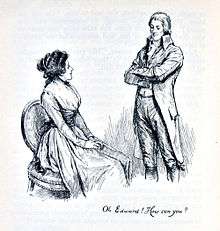Edward Ferrars
Edward Ferrars is a fictional character in Jane Austen's 1811 novel Sense and Sensibility. He is the elder of Fanny Dashwood's two brothers and forms an attachment to Elinor Dashwood.
| Edward Ferrars | |
|---|---|
| Jane Austen character | |
 | |
| In-universe information | |
| Full name | Edward Ferrars |
| Gender | Male |
| Family | Late Mr. Ferrars, Mrs. Ferrars |
| Relatives | Fanny Ferrars Dashwood, Robert Ferrars |
| Home | Mainly in London with his mother; occasionally at Norland Park; the rest of the time in Oxford |
As first described in Sense and Sensibility: "Edward Ferrars was not recommended to their good opinion by any peculiar graces of person or address. He was not handsome, and his manners required intimacy to make them pleasing. He was too diffident to do justice to himself; but when his natural shyness was overcome, his behaviour gave every indication of an open, affectionate heart. His understanding was good, and his education had given it solid improvement. But he was neither fitted by abilities nor disposition to answer the wishes of his mother and sister, who longed to see him distinguished—as—they hardly knew what."
His personality, while it lacks the flash of Marianne Dashwood's romantic interest Willoughby, indicates more fortitude. Despite the good common sense that links him to Elinor, he is able to attach himself to other people and form bonds of friendship and love with ease. He exemplifies great loyalty when he sacrifices his potential happiness with Elinor to honor a promise he made to another girl when he was younger. He and Marianne's future husband Colonel Brandon are both models of great character under unimpressive exteriors. This simplicity makes them rather less three-dimensional than Pride and Prejudice's Fitzwilliam Darcy and Emma's Mr. Knightley.
He eventually marries Elinor after he is abandoned by Lucy Steele for his now propertied brother.
Notable portrayals
- Chetster Stratton in the 1950 NBC miniseries, directed by Delbert Mann.[1]
- Robin Ellis in the 1971 BBC miniseries, directed by David Giles.[2]
- Bosco Hogan in the 1985 BBC miniseries, directed by Rodney Bennet.[3]
- Hugh Grant in the 1995 film adaptation, directed by Ang Lee.[4]
- Ajith Kumar in the 2000 Tamil adaptation Kandukondain Kandukondain[5]
- Dan Stevens in the 2008 BBC miniseries, directed by John Alexander.[6]
- Nicholas D'Agosto as "Edward Ferris" in the 2011 film From Prada to Nada.
- Henry Devas in 2013 BBC Radio 4 adaptation by Helen Edmundson.[7]
References
- Parrill, Sue (2002). Jane Austen on Film and Television: A Critical Study of the Adaptations. Jefferson, NC: McFarland & Company. p. 189.
- Pucci, Suzanne R. (2003). Jane Austen and Co.: Remaking the Past in Contemporary Culture. New York: SUNY Press. p. 263. ISBN 978-0791456163.
- Baker, William (2008). Critical Companion to Jane Austen: A Literary Reference to Her Life and Work. New York: Infobase Publishing. p. 535. ISBN 978-0816064168.
- Troost, Linda (2001). Jane Austen in Hollywood. Lexington, KY: University Press of Kentucky. p. 121. ISBN 9780813190068.
- McHodgkins, Angelique Melitta. INDIAN FILMMAKERS AND THE NINETEENTH-CENTURY NOVEL:REWRITING THE ENGLISH CANON THROUGH FILM.
- Terrace, Vincent (2009). The year in television, 2008 : a catalog of new and continuing series, miniseries, specials and TV movies. Jefferson, NC: McFarland. p. 104. ISBN 9780786453368.
- "BBC - Sense And Sensibility - Media Centre".